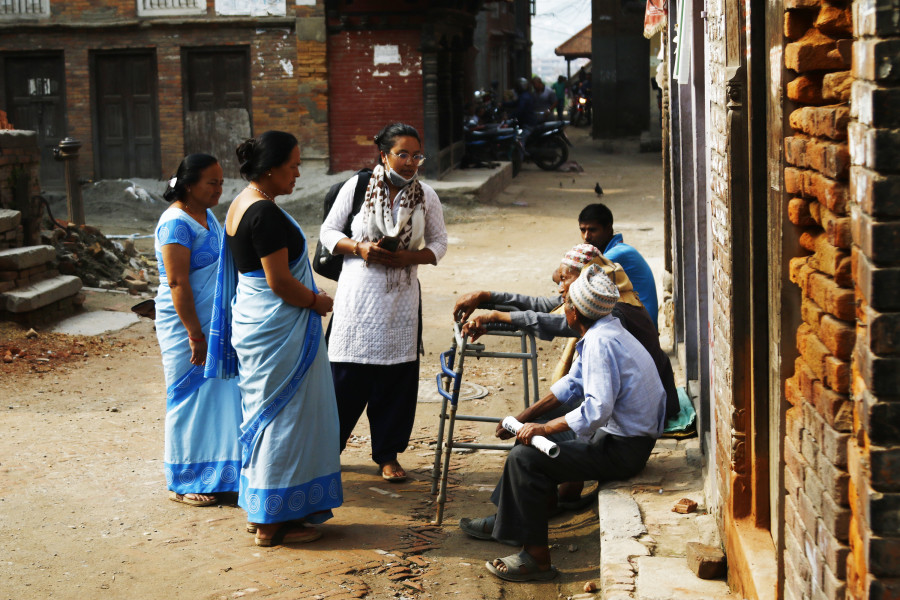Valley
In Bhaktapur, healthcare comes to your door
For the past two years, Bhaktapur municipality has been delivering free healthcare—right to patients’ homes
Arjun Poudel
Every morning, Sabina Duwal leaves home with a medical bag containing the essentials for any health practitioner—a stethoscope, a thermometer, and a blood pressure monitor, along with everyday over-the-counter medication. She walks around the neighbourhoods in Bhaktapur Municipality, visiting every household that has sick people, elderly members, pregnant women, new mothers, and the physically and mentally challenged. Accompanied by two female community health volunteers—Shanti Maya Gainju and Maiya Keshari Kusi—Duwal, a nurse, makes certain that everyone is well and taken care of, offering advice, medication and simple home remedies.
“We do our best to give proper nursing care to locals,” said Duwal, who was hired by the municipality office to provide health care services to locals—in their homes.
For the last two years, the municipality has been employing 10 staff nurses, one for each of Bhaktapur’s 10 wards. The nurses are accompanied by female community health volunteers, like Gainju and Kusi, who are locals and are able to help identify patients who need assistance or treatment.
This nursing team provides basic health care services, including measuring blood pressure, providing postnatal and antenatal care, and counselling new mothers on precautionary measures for the safety of both the mother and their newborns.
On Monday, the nursing team of Duwal, Gainju and Kusi visited Samjhana Prajapati, 24, a new mother from Jagati-9. Duwal examined both the new mother and her baby and cautioned against possible infection. The baby was underweight and Duwal suggested that Prajapati eat a nutritious diet and breastfeed her infant every 15 minutes.
Prajapati said that she had received all her antenatal care from healthcare facilities but all her postnatal care right at home, from staff nurses like Duwal.
At a time with the Healthy Ministry is concerned that it will not meet maternal mortality targets, Bhaktapur in ensuring that its pregnant women and new mothers receive proper care and do not succumb to easily preventable infections and ailments. Currently, for every 100,000 live births 229 women die during or after childbirth, according to the Health Ministry. Among them, 24 percent die during or after childbirth while 19 percent die in the postnatal period. In order to meet the United Nations’ Sustainable Development Goal of reducing maternal mortality to 75 deaths per 100,000 live births by 2030, the current rate should be 125 per 100,000.
One of the reasons Bhaktapur started its healthcare at home programme was to keep the maternal mortality low, especially when it came to postnatal complications. Since the programme began two years ago, there have been no recorded postnatal deaths, according to Dr Ratna Sundar Lasiwa, chief of the Bhaktapur Public Healthcare Centre.
Along with providing postnatal care, nurses are also providing basic healthcare to those who need it most but are often unable to visit healthcare facilities, like the elderly, and the physically and mentally challenged.
Laxmi Manandhar, a 64-year-old from Tilachhi of Ward 9, has been looking after her husband, 84-year-old Kaji Bahadur, for years now. Kaji Bahadur is partially paralysed and could barely move, but the nursing staff has been hard at work on him, teaching him exercises he can practices.
Now, he can move slowly and go to the toilet by himself, said Manandhar.
“I am fully satisfied with the service of nursing staff,” she said. “My husband does not listen to me, but he follows the instructions of health workers.”
According to Duwal, it is easier for patients to talk to the nursing staff at home rather than at healthcare centres and hospitals. Often, patients, especially the elderly, are uncomfortable visiting hospitals and telling doctors their problems, but they feel comfortable speaking to a nurse who visits their home often, she said.
The nursing staff also ensure all children are up-to-date with their immunisations and are receiving proper nutrition.
With the rate of immunisation declining across the country, since the implementation of federalism, health experts have been worried. But Bhaktapur not only declared itself a fully immunised municipality last year but is also preparing to declare that it has sustained that complete immunisation rate this year too. Health workers have verified that all children under 15 months of age have received all their vaccines, said Lasiwa.
The nursing programme is part of a broader drive by the city of Bhaktapur to expand healthcare services, says Lasiwa. The municipality plans to open up its own public hospital while expanding services at the healthcare centre, including hiring 70 health workers. The municipality also provides consultant care for just Rs 50 for new patients and Rs 30 for follow-ups, hiring 14 consultant doctors, which include a gynaecologist, paediatrician, psychiatrist, dental surgeon, and physicians.
“We know who is suffering from what ailment in Bhaktapur,” said Lasiwa.
According to Lasiwa, the municipality has records of all patients suffering from hypertension, diabetes, thyroid, heart disease, gastritis, kidney stones, arthritis, chronic obstructive pulmonary disease, cholesterol, uric acid, mental health problems, neurological problems, and cancer. The city aims to provide healthcare accordingly.
For many locals, Bhaktapur provides an example of how elected representatives can live up to their promises. During the 2017 local elections, the Nepal Workers and Peasants Party, which has maintained a stronghold in Bhaktapur for decades, had declared that it would provide healthcare services at home if it was elected. To no surprise, the party won.
“And we simply implemented the party’s election manifesto,” said Lasiwa.




 11.42°C Kathmandu
11.42°C Kathmandu













